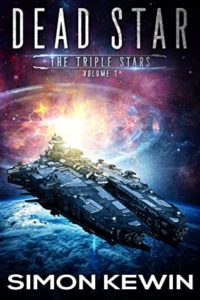
Six Semifinalists from the Self-Published Science Fiction Competition (SPSFC) were passed to me from first round judges who had rated them among the top three of initial 30-book allotments. My fifth book of those six was Simon Kewin’s Dead Star, which promised an interstellar journey to track down the mysterious history that led to the rise of the tyrannical Concordance—and whose exposure could bring about their downfall.
The plot is pretty much as promised. The sole survivor of a planet destroyed by the Concordance falls in with an isolated genius who has made it his life’s work to figure out how an insignificant religious sect suddenly became powerful enough to so thoroughly destroy the existing galactic powers and suppress their history. And so his mission becomes her mission, as they follow a trail of rumors and anomalies to the secret that they hope will free humanity from Concordance rule.
I really enjoy stories about secret or forgotten histories, so it didn’t take long to be hooked by the premise of Dead Star. But the author certainly aids that investment by maintaining a steady flow of small discoveries along the way. Combine that with an easy-to-read prose style that never pulled me out of the story, and Dead Star was far and away the best page-turner of any book I’ve read as part of this competition.
It was not, however, without its flaws. Though the burning central mystery kept me invested regardless, the villains were mustache-twirlers, and the main characters far too often put themselves into mortal danger for reasons that weren’t entirely clear to me, invariably to escape at the last moment—often via a mechanism previously unknown or thought impossible. Now part of that unnecessary danger stems from an inexperienced lead still recovering from the trauma of seeing everyone she’d ever known killed by the Concordance. But while the characterization gave reasons for these actions, it wasn’t quite engrossing enough for me to feel the decisions as natural.
The other big potential sticking point was the ending. Dead Star opens a (completed) trilogy, and to its credit, it arrives at a reasonable waystation on the journey to discovery of Concordance’s secrets—I’ve certainly read much worse cliffhangers. But on the other hand, there’s also not a lot of closure, with no plot arc hitting a satisfying resolution. It’s absolutely enough to make me want to read book two, but at the same time, the first book doesn’t get the credit for work that it won’t accomplish until the sequel. A more robust ending might have elevated what came before—especially if it gave a compelling reason for the Concordance’s over-the-top villains—but the actual ending was instead a promise of more to come.
Overall, I found this an easy story to devour. Even if the lead was a bit too rash and the villains a bit too shallow, the mysterious history that animated the plot was fascinating, and the writing style made it hard to put down. I don’t feel like I can fully evaluate the story until I read the rest of the trilogy, but the first book certainly motivates me to read the rest of the trilogy.
Recommended if you like: secret histories, flights through space with an indefatigable enemy at your heels.
Can I use it for Bingo? It’s hard mode for Self-Published and Revolution or Rebellion, and it also includes Family Matters and No Ifs Ands or Buts.
Overall rating: 15 of Tar Vol’s 20. Four stars on Goodreads.
SPSFC Score: 7.5/10 for my personal score. We will await results from the other judges before announcing an official team score.
